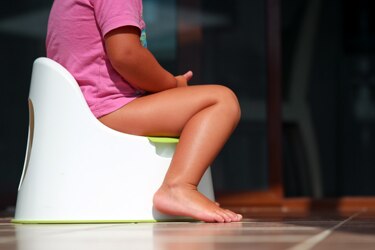Definition & Facts for Chronic Diarrhea in Children
What is chronic diarrhea in children?
Chronic diarrhea is passing loose, watery stools three or more times a day for at least 4 weeks. Children with chronic diarrhea may have loose, watery stools continually, or their diarrhea may come and go. Chronic diarrhea can affect children of any age.

Diarrhea that lasts only a short time is called acute diarrhea. Acute diarrhea, a common problem in children, usually lasts a few days and goes away on its own.
What are the complications of chronic diarrhea in children?
Malabsorption
Certain diseases and conditions that cause chronic diarrhea may cause malabsorption—a condition in which a child’s body can’t absorb nutrients from foods, resulting in shortages of protein, calories, and vitamins. See a list of malabsorption symptoms.
A child who does not absorb enough nutrients from the food he or she eats may become malnourished. Malnourishment during the years when nutrition is important to a child’s normal growth and development can result in health problems.
Dehydration
Chronic diarrhea may lead to dehydration. With diarrhea, especially acute diarrhea, a child’s body loses more fluid and electrolytes in loose stools than solid stools. See a list of dehydration symptoms.
This content is provided as a service of the National Institute of Diabetes and Digestive and Kidney Diseases
(NIDDK), part of the National Institutes of Health. NIDDK translates and disseminates research findings to increase knowledge and understanding about health and disease among patients, health professionals, and the public. Content produced by NIDDK is carefully reviewed by NIDDK scientists and other experts.
The NIDDK would like to thank:
Mark Donowitz, M.D., Johns Hopkins University School of Medicine

